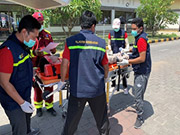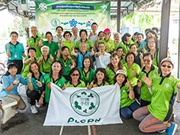Although Thailand has become an upper-middle income country, in order for the country to sustainably develop, aside from covid-19, there are issues to be dealt with such as industrial human resources development, capacity building of R & D for high value-added industry, quality infrastructure development, promotion of disaster management including flood control, and energy, environment and climate change, in line with the Sustainable Development Goals (SDGs). It is also necessary to address issues such as the aging society, support for the socially vulnerable, and the mitigation of disparity, as Thailand becomes a mature society.
Located in the center of the Indochina Peninsula and facing both the South China Sea and the Indian Ocean, Thailand occupies an important geopolitical position, plays a central role in the ASEAN Community and is a key country for the further development of the Mekong region in the Free and Open Indo-Pacific. Common issues in ASEAN countries to be addressed actively by cooperation between Thailand and Japan include strengthening ties among ASEAN countries, deepening economic integration and mitigating disparity.



JICA focuses on three priority areas in Thailand: "Sustainable development of the economy and coping with a maturing society", "Coping with common issues in ASEAN countries", and "Providing support for Third Countries".
(1) Sustainable development of economy and coping with maturing society
For the mutual benefit of the economy and society in Thailand and Japan, cooperation is undertaken for industrial human resources development, improvement of urban functions such as traffic congestion alleviation, quality infrastructure development such as distribution and ICT, promotion of disaster management, and promoting international joint research, to provide the basis for sustainable development of economy and society. In addition, cooperation is undertaken on issues to solve as Thailand becomes a mature society, such as environment and climate change, the aging society, and support for the socially vulnerable, by utilizing Japanese knowledge and experience.
(2) Coping with common issues in ASEAN countries
Cooperation is undertaken in order to strengthen ASEAN connectivity, deepen economic integration, and mitigate disparity among ASEAN/Mekong countries. In particular, by supporting the unique efforts of Mekong countries, such as the realization of the ACMECS Master Plan, to promote initiatives that contribute to the independent growth of Mekong countries.
(3) Providing support for Third Countries
Cooperating with Thailand to provide assistance for development issues in the ASEAN/Mekong Region and other countries beyond ASEAN as well targeting. countries of mutual interest and straegy. Particularly, under Japan's important policies such as the Free and Open Indo-Pacific (FOIP) and the Japan-Thailand Partnership Programme Phase 3 (JTPP3) renewed in October 2019, it implements joint cooperation for other developing countries through various programs such as Third Country Training Programmes and dispatching experts, and also pursuing new modality of cooperation, such as co-financing for infrastructure projects in neighboring countries.





scroll